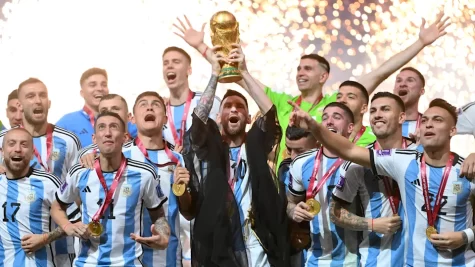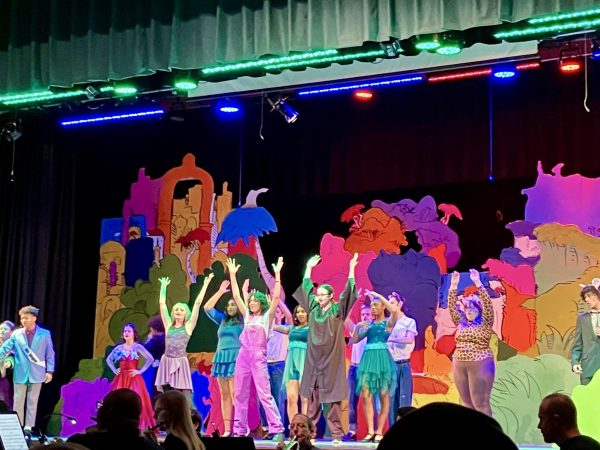FIFA World Cup 2022
Every four years, FIFA holds their highly anticipated World Cup featuring qualifying countries around the world. This year, the World Cup took place from Nov. 20, 2022 to Dec 18, 2022 in Qatar. Qatar hosted thirty-two varying countries in their arenas with eight separate divisions. On Sunday, Dec. 18, 2022 Argentina and France competed in the World Cup 2022 finale and drew in over 1.5 billion viewers worldwide. The prestigious World Cup has significant cultural history, proposes a way for people to get involved in a national sport, and for countries and their civilians to come together.
The FIFA World Cup is a globally respected tradition that first started in 1930. With only thirteen countries competing in the first ever World Cup, it instantly became adapted as a distinguished competition between only the best soccer teams in the world. Every World Cup, a committee of FIFA congress members decide where the World Cup will take place. In previous years the World Cup has taken place in countries such as the USA, Brazil, Japan, France, and Russia. In past World Cup tournaments, Brazil is considered to be one of the highest-ranking soccer playing countries, with having played in every single World Cup and 5 total wins throughout the years. With the renowned history the World Cup has been known for the past 90 years, it is precedent that the FIFA congress carefully evaluates the important process of the World Cup.
Due to the fact that dozens of countries participate in the World Cup, it is no surprise that it attracts varieties of diverse audiences, tuning in on nearly every household worldwide. As forecasted, the World Cup allows its viewers to become heavily involved in the tournament with every match. When Becton Students were asked who they had originally rooted for when the game started, most had responded with countries in which they have a significant cultural similarity with. Becton student Rounas Hu responds, “I was initially rooting for Brazil. The reason why I was rooting for them is because ever since I was little, I’ve been rooting for them and really wanted them to win another year for the world cup.” Hu explains how his lifelong support for Brazil had originally stemmed from his childhood and how ever since then, he had been rooting for Brazil. With the data collected from the Becton students, it can be concluded that the motivation for most students rooting for a team derives from their cultural and childhood beginnings.
In addition to the memorial background history of the World Cup, another main factor of the long-awaited competition is the predictions and highly intensified matches the tournament features. Viewers watching the matches often converse with friends, family, and peers about who they believe will take victory in the World Cup. Ranging from varied countries participating in the World Cup, the audience undergoes the exhilarating feeling of rivalry and competition through the screen. Becton student, Allen Vega, rehashes, “Argentina Vs Croatia was the most exciting game since it was the match that would decide if Messi would make it to the finals. Since the 2022 World Cup could be Messi’s final WC Tournament, I was heavily rooting for Argentina.” Vega’s response on what match played was the most exciting, further backs up the claim that viewers become heavily involved in the games. On top of that, predictions made by fans construct what makes the World Cup compelling to the crowd.
Overall, The World Cup initiates non-participators to start conversations with people around them about what transpired during the period of the tournament. The World Cup is recognized by its audience as an enjoyable experience to look forward to. In our own halls, specific matches have the students participating in representing certain countries on game day. Students are able to represent their choice of country and spread the exhilarating sportsmanship the World Cup represents. Becton student, Ashlee Offreda, replies, ”The World Cup brings people from all over the world together through one common interest. This is a beautiful thing to see people who might be complete opposites bond over a common love for a sport. That must be why people enjoy the World Cup, or maybe they just like soccer.” Offreda examines the argument that the main reason why everyone seems to be enticed by the World Cup is solely due to the idea that when given the opportunity for people to root for a team they resonate to, the audience tends to get more involved in the games.

Source: olympics.com
This past Sunday, the World Cup final game was played against Argentina and France for a thrilling game. It was a close call, but ultimately Argentina took the win for the FIFA World Cup 2022. In 2026, the World Cup is expected to be played in 3 countries around the world including the USA, Canada, and Mexico. For more exciting news, a few selected games will be played here in MetLife East Rutherford, New Jersey. Maybe, considering multiple games may be played in the USA, we might be able to have a home advantage!
In conclusion, the impact the World Cup has on watchers, on a global standpoint, can prove the idea that this competition brings in over 1.8 million viewers together to experience groundbreaking FIFA history. The significant background of the renowned World Cup makes the event more prestigious and anticipated and allows watchers to come up with calculated predictions. Who the audience decides to root for mainly consists of their roots and cultures that might convince them to gravitate towards a certain country. The FIFA World Cup is a prominent, and enjoyable, way for people who may seem different in every aspect, to come together to enjoy a game of soccer.

The Cat’s Eye View welcomes the newest member Kimi Tampadong! She is a sophomore at Becton Regional High School. As a writer, she hopes to gain a new...













